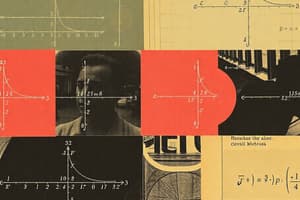Podcast
Questions and Answers
Which of the following statements about a system of linear equations is true?
Which of the following statements about a system of linear equations is true?
- Parallel lines in a system indicate no solution exists. (correct)
- A unique solution indicates that the equations represent the same line.
- It must always result in either one solution or none.
- It can have at most one solution regardless of the equations.
What characteristic defines a consistent and dependent system of linear equations?
What characteristic defines a consistent and dependent system of linear equations?
- The equations have different slopes.
- The system produces a non-repeating solution.
- There is exactly one point of intersection for the equations.
- The equations represent the same line. (correct)
In which situation would you likely use the elimination method to solve a system of equations?
In which situation would you likely use the elimination method to solve a system of equations?
- When both equations are linear and in slope-intercept form.
- When you cannot easily isolate a variable in either equation.
- When you have a system that clearly intersects on a graph.
- When the coefficients of one variable are already equal. (correct)
Which method is best suited for visualizing the solution to a system of linear equations?
Which method is best suited for visualizing the solution to a system of linear equations?
When using the substitution method, what is the first step one must take?
When using the substitution method, what is the first step one must take?
What type of solution indicates that two lines in a system of equations have the same slope but different intercepts?
What type of solution indicates that two lines in a system of equations have the same slope but different intercepts?
Which operation is typically performed when using the matrix method to solve a system of equations?
Which operation is typically performed when using the matrix method to solve a system of equations?
What is a common misconception regarding the number of solutions a system can have?
What is a common misconception regarding the number of solutions a system can have?
Which of the following methods would likely be ineffective if both equations have drastically different slopes?
Which of the following methods would likely be ineffective if both equations have drastically different slopes?
What should one always do after finding a solution to a system of equations?
What should one always do after finding a solution to a system of equations?
Flashcards are hidden until you start studying
Study Notes
Linear Equations in Two Variables: Solving Systems of Equations
Definition
- A system of linear equations consists of two or more linear equations with the same set of variables.
Methods of Solving Systems of Equations
-
Graphical Method
- Plot each equation on the same set of axes.
- The solution is found at the point(s) where the lines intersect.
- Can identify one solution, no solution, or infinitely many solutions.
-
Substitution Method
- Solve one equation for one variable in terms of the other.
- Substitute this expression into the second equation.
- Solve for the remaining variable.
- Back-substitute to find the first variable.
-
Elimination Method
- Align the equations vertically.
- Multiply one or both equations to obtain equal coefficients for one variable.
- Add or subtract the equations to eliminate one variable.
- Solve for the remaining variable, then back-substitute.
-
Matrix Method (Using Matrices)
- Represent the system as an augmented matrix.
- Use row operations to achieve reduced row echelon form.
- Extract solutions from the resulting matrix.
Types of Solutions
- Unique Solution: One intersection point; the system is consistent and independent.
- No Solution: Lines are parallel; the system is inconsistent.
- Infinitely Many Solutions: Lines overlap; the system is consistent and dependent.
Tips
- Always check solutions by substituting back into original equations.
- Be mindful of special cases where coefficients of variables lead to parallel or identical lines.
- Graphing can provide a visual confirmation of the solution type.
Definition of Linear Systems
- A system of linear equations includes two or more equations using the same variables.
Methods of Solving Systems of Equations
-
Graphical Method
- Involves plotting equations on a graph.
- Solutions occur at intersection points of the lines.
- Can result in one solution, no solutions, or infinitely many solutions.
-
Substitution Method
- Derive one equation to express a variable in terms of the other.
- Replace the derived variable in the second equation.
- Solve for one variable, then back-substitute to find the other.
-
Elimination Method
- Arrange equations vertically to align similar variables.
- Adjust equations to create equal coefficients for one variable through multiplication.
- Add or subtract to eliminate a variable, solve for the other, and back-substitute.
-
Matrix Method
- Represent the system in an augmented matrix format.
- Apply row operations to reach reduced row echelon form.
- Extract the solutions from the final matrix.
Types of Solutions
-
Unique Solution
- Occurs when there is exactly one intersection point; system is consistent and independent.
-
No Solution
- Happens when lines are parallel; system is inconsistent.
-
Infinitely Many Solutions
- Arises when lines completely overlap; system is consistent and dependent.
Tips for Solving
- Verify solutions by substituting back into original equations.
- Pay attention to cases where coefficients suggest parallel or identical lines.
- Graphing serves as a useful tool for visual confirmation of solution types.
Studying That Suits You
Use AI to generate personalized quizzes and flashcards to suit your learning preferences.




